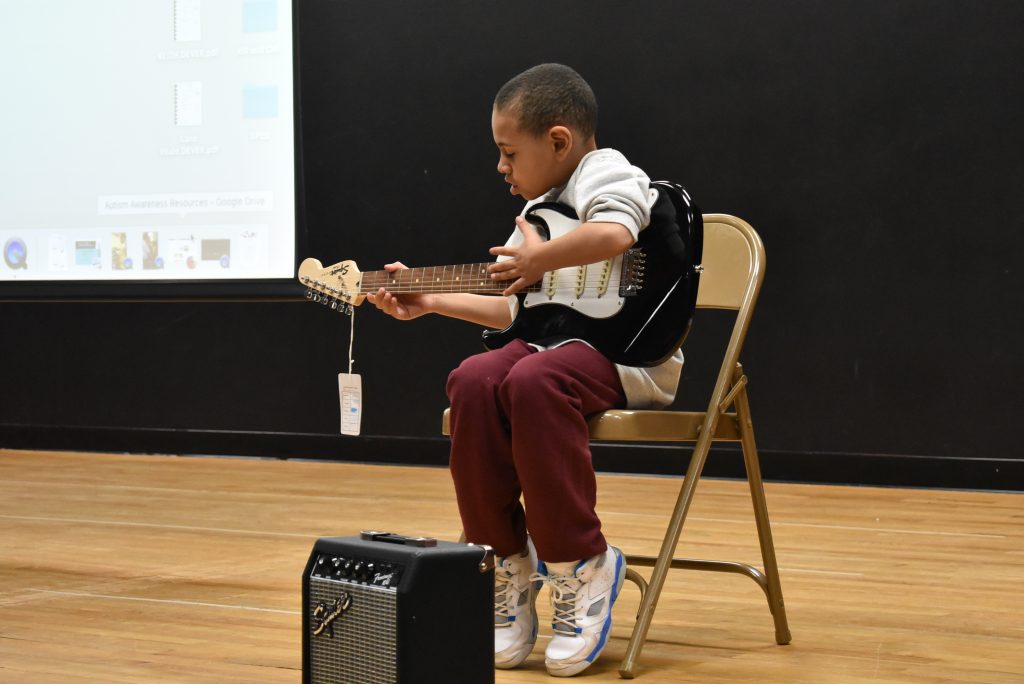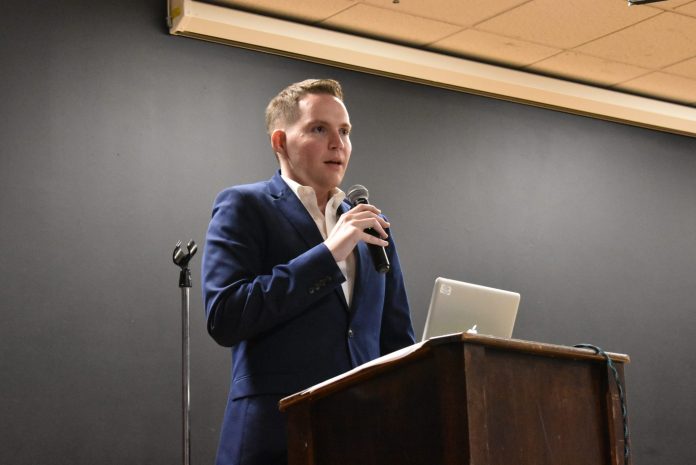With “Uptown Funk” booming from speakers and a crowd excited for the final act in the talent show, 9-year-old Keith Coleman strummed his guitar in the auditorium at New Foundations Charter School. Unable to get a tight grip on the instrument, it slipped between his knees and clattered to the floor, but that slip-up didn’t deter him. Making his recovery, he seized the guitar and stood from his chair, pacing the stage like a rock star.
When he strummed his final note, parents and fellow students in attendance at the school’s Annual Autism Awareness Family Night burst into applause. The theme of the night, according to special guest speaker Dr. Kerry Magro, was seeing autism appear differently to everyone diagnosed with it.
“Autism truly is a spectrum,” he said. “We have a saying in our community where if you’ve met one individual with autism, you’ve met one individual with autism.”
Diagnosed with autism at a young age, Magro is a professional speaker focusing on motivational speeches involving disability-related topics, having spoken at over 900 different events across the globe in the past nine years.
He visited New Foundations on April 11 to speak about his experience growing up with autism and how he was able to transition into an independent adult. April marks National Autism Awareness Month, but Magro would prefer to see it as more of an autism acceptance month.

“Please know that autism can’t define our loved ones, and only we can help them define autism,” he said.
Magro was nonverbal when he was 2 and a half years old, and was diagnosed with Pervasive Developmental Disorder-Not Otherwise Specified, a form of autism, when he was just 4 years old.
“You would know that when I was in school, my peers labeled special education wrong, instead of special,” Magro read as part of a poem he had written. He said he spent “hundreds of hours a year” in physical, occupational, speech, music and theater therapy to get him where he is today.
“You would also know, though, that unfortunately I spent hundreds of hours a year being bullied because of my autism diagnosis,” he read.
Magro recounted sensory overloads he experienced as a kid, including not being able to get a haircut due to the sensation so he grew his hair out “like a rock star.” He also requested bologna sandwiches for every meal as a picky eater, and didn’t have strong enough social skills to stand up against bullies. He said practices like role-playing certain social scenarios and learning from other self-advocates helped him overcome some of his issues. He also recommended keeping a daily journal for things they liked and didn’t like throughout their day to help express themselves.
On his Facebook page A Special Community, Magro interviews young people on the autism spectrum about their experiences, ambitions and anything else they want to share with the world. He brings a camera and tripod everywhere he speaks to give people the opportunity to talk about what they want the world to know about them.
“One of the biggest misconceptions I often see in the autism community is the misdiagnosis but also the unfortunate fact that girls in our community fall through the cracks most of the time,” Magro said. “Right now in our community one in 59 have autism. One in 34 of them are boys, and one in 151 are girls.”
He shared the story of Rebecca Barcellona, a girl from Florida on the autism spectrum with aspirations to become Miss America. In her video interview with Magro, she expressed that she loves school and refused to give it up.
“Her story of not being defined by her label is something I can only hope becomes a universal message,” Magro said.
When she was just 3 Rachel could remember people telling her mom that she had some 'screws loose' because she has autism. Today Rachel is a huge autism advocate with a very bright future.
Posted by A Special Community on Wednesday, May 2, 2018
As the meeting went on, Magro had parents and kids split into pairs and discuss the first time they had been introduced to the topic of autism
Magro has published three books; Defining Autism From The Heart, which describes what it’s like to live with autism from an emotional stance; Autism and Falling in Love, which speaks about his own romantic experience; and College for Students with Disabilities: We Do Belong, based on his journey navigating post-secondary education on the autism spectrum. All books can be found on Amazon.
To find Magro’s Facebook group, go to www.facebook.com/ASpecialCommunity/.





